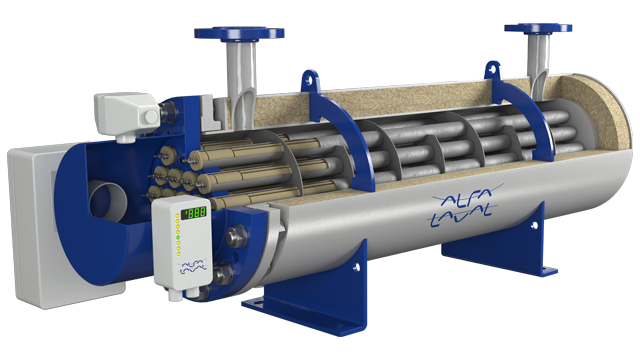Enhancing Efficiency: Shell and Tube Heat Exchangers and Heat Transfer Products
 |
| Shell and Tube Heat Exchangers |
In the world of thermal engineering and industrial processes, efficient heat transfer is essential. Industries such as petrochemicals, power generation, and food processing rely heavily on heat exchangers to manage temperature differentials and optimize their operations. Among the many types of heat exchangers available, the shell and tube heat exchanger stands out as a versatile and reliable solution. In this article, we'll explore the fascinating world of shell and tube heat exchangers and other heat transfer products, highlighting their importance, applications, and the latest innovations in the field.
The Basics of Heat Exchangers
Before delving into the specifics of shell and tube heat exchangers, it's important to understand the fundamental concept of heat exchangers. These devices are designed to transfer heat from one fluid to another without the fluids coming into direct contact. Heat exchangers play a crucial role in various industrial processes, including cooling and heating applications.
Heat exchangers come in several configurations, including shell and tube, plate, finned-tube, and more. Each type offers unique advantages and is suitable for different applications. However, the focus of this article is on shell and tube heat exchangers due to their widespread use and versatility.
Shell and Tube Heat Exchangers: A Closer Look
Shell and tube heat exchangers are one of the most commonly used types of heat exchangers in industrial applications. They consist of a cylindrical shell with multiple tubes running through it. One fluid flows through the tubes, while the other flows around the outside of the tubes within the shell. Heat is transferred from the hot fluid (inside the tubes) to the cold fluid (outside the tubes) through the tube walls.
Here are some key features and benefits of shell and tube heat exchangers:
Versatility: Shell and tube heat exchangers can handle a wide range of temperature and pressure conditions, making them suitable for various industries, including chemical processing, power generation, HVAC, and food and beverage.
Efficiency: These heat exchangers offer excellent thermal performance and can achieve high heat transfer rates, ensuring efficient energy utilization.
Durability: Shell and tube heat exchangers are known for their robust construction, which allows them to withstand corrosive environments and high-pressure applications.
Easy Maintenance: Their design facilitates easy access to the tubes for cleaning or replacement, ensuring minimal downtime and maintenance costs.
Customization: Manufacturers can customize shell and tube heat exchangers to meet specific requirements, such as size, material, and heat transfer capacity.
Applications of Shell and Tube Heat Exchangers
Shell and tube heat exchangers find application across a wide range of industries due to their versatility and efficiency. Here are some common applications:
Petrochemical Industry: Shell and tube heat exchangers are used to cool or heat various process fluids, including crude oil, natural gas, and petrochemical products.
Power Generation: They play a crucial role in power plants by cooling steam, condensing exhaust gases, and transferring heat between different stages of power generation processes.
HVAC Systems: These heat exchangers are integral components of air conditioning and refrigeration systems, helping to cool or heat air and refrigerants.
Food and Beverage: In food processing, shell and tube heat exchangers are employed for pasteurization, sterilization, and temperature control in cooking and cooling processes.
Pharmaceutical Industry: They are used for heating and cooling processes in pharmaceutical manufacturing, ensuring precise temperature control for sensitive materials.
Innovations in Heat Transfer Products
As technology continues to advance, the field of heat transfer products is not left behind. Manufacturers are constantly striving to enhance the efficiency and sustainability of heat exchangers and related products. Here are some notable innovations in the world of heat transfer:
Enhanced Materials: Researchers are developing advanced materials with superior heat transfer properties and resistance to corrosion. These materials can extend the lifespan of heat exchangers and improve their performance.
Compact Designs: Miniaturization of heat exchangers allows for more efficient space utilization in industrial processes. Compact heat exchangers are particularly beneficial in applications with limited space.
Plate Heat Exchangers: Plate heat exchangers have gained popularity due to their compact design and high heat transfer efficiency. They are increasingly used in industries where space and energy efficiency are critical.
Eco-Friendly Solutions: Heat exchanger manufacturers are focusing on environmentally friendly designs that minimize energy consumption and reduce greenhouse gas emissions.
IoT Integration: The integration of the Internet of Things (IoT) technology allows for real-time monitoring and control of heat exchangers, enabling predictive maintenance and optimizing energy usage.
Conclusion
Shell and tube heat exchangers and other heat transfer products are indispensable in various industrial processes. They ensure the efficient transfer of heat, contributing to energy savings and operational excellence. With ongoing innovations in materials and design, heat exchangers are becoming more efficient, sustainable, and adaptable to the evolving needs of industries worldwide. As industries continue to prioritize energy efficiency and sustainability, the role of heat exchangers in optimizing processes and reducing environmental impact remains crucial. Whether in petrochemicals, power generation, HVAC, or food processing, these heat transfer products play a vital role in keeping industries running smoothly and efficiently.



Comments
Post a Comment